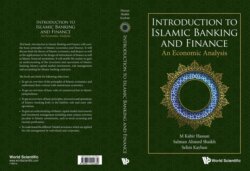Читать книгу Introduction to Islamic Banking and Finance - M Kabir Hassan - Страница 14
На сайте Литреса книга снята с продажи.
1.1.4Building blocks of Islamic finance
ОглавлениеOne of the most distinctive elements of Islamic finance is the non-existence of Riba (interest) in financial transactions. Islamic law forbids Riba (interest) just like all monotheistic faiths, including Christianity and Judaism. This view on interest is taken up by all Abrahamic faiths and other distinguished scholars in history.
Aristotle commented on interest as follows: Of all modes of getting wealth, this is the most unnatural. Moreover, Thomas Aquinas said: To take usury for money lent is unjust in itself, because this is to sell what does not exist and this evidently leads to inequality which is contrary to justice.
In mainstream economics literature, we also find criticism of interest. John Maynard Keynes in his seminal book General Theory of Income, Employment, Interest and Money commented as follows:
Interest to-day rewards no genuine sacrifice, any more than does the rent of land. The owner of capital can obtain interest because capital is scarce, just as the owner of land can obtain rent because land is scarce. But whilst there may be intrinsic reasons for the scarcity of land, there are no intrinsic reasons for the scarcity of capital.39
The term Riba in Islamic finance refers to any stipulated increase over the principal amount of loan. Thus, the term Riba incorporates usurious loans as well as modern-day interest in banking, debt markets, and contracts.
Islamic law does not guard capitalists with a fixed return on money capital to accumulate more wealth without bearing any potential loss in the commercial undertaking for which the loan was provided. Instead, Islamic law makes it necessary for money-capital owners to bear the risk of the productive enterprise to earn any legitimate growth in money capital. Islamic law permits profit on the trade of assets including consumer goods and capital goods if the seller has the ownership and risk of the goods prior to bringing them for selling to others. In Islamic law, Bai means a sale transaction between buyer and seller in consideration for a price. After executing Bai, the ownership and risk transfer from the seller to the buyer. Islam permits Bai; however, Islamic law does not permit earning money from lending money without undertaking risk in a productive enterprise.
Further, Islam emphasizes transparency in relations and economic exchanges. Thus, it prohibits Gharar (uncertainty) in a transaction that can potentially lead to significant losses down the road due to misinformation.
Gharar implies significant uncertainty in any contract regarding the details of the contract, such as specification, quantity, and quality of the subject matter. Gharar is also there when there is ambiguity about price, mode of delivery, and payment terms.
Islam also forbids Maysir (gambling) due to its negative effects on distributive justice as well as on the moral standards of earning a livelihood. Since Islam forbids Maysir, it implies that most contemporary financial derivatives, convertible securities and the contemporary system of insurance also stand prohibited if they involve an element of Maysir. In contrast, Islam encourages striving to earn a livelihood through labour, and if there is surplus wealth, Islam encourages that it is invested in real productive enterprise and the payoffs shared from the productive enterprise equitably. This ensures distributive justice, employment of idle resources and circulation of wealth through growing real sector economic activities.
In the financial contracts, Islam emphasizes transparency, full disclosures, rule abidance, justice, truthfulness, and excellence in conduct, both in letter and spirit as elaborated in the previous section.
Islamic financial institutions comply with Islamic rules to offer financial services in the areas of (i) financing real assets through sale, lease and equity-based modes of financing, (ii) investments in real assets and enterprise, and (iii) risk management through mutual risk sharing.
Finally, Islamic social finance comprises institutions which aim to perform the redistributive function by wealth and asset reallocation from the rich to the poor, from the haves to the have-nots, and from the wealthy to the deserving people through institutions, such as Zakat (a wealth tax on people owning wealth above a threshold amount known as Nisab) and Waqf (Islamic endowments). Property-based Waqf can earn income through the rents on properties. In turn, these proceeds can be used to finance the needs for social development. Cash Waqf can provide Qard Hassan (interest-free loans) to the needy in sectors like education, health, and agriculture.
Thus, we see that the Islamic finance ecosystem has sufficient variety of institutions as rules and product structures to meet the contemporary financial needs responsibly and ethically in line with Islamic principles. Figure 1.1 shows the major institutions in Islamic finance architecture. Islamic finance can be divided into commercial and social finance, which together cater to the needs of all the broad sections of the society.
